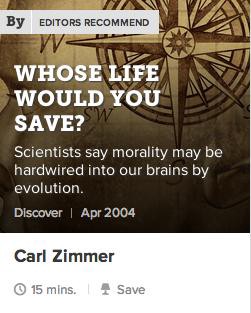What Are You Reading?
by John Shankman
Over the next few weeks for a sponsored project on behalf of Byliner, The Billfold’s Mike Dang and our publisher John Shankman will be selecting stories from the Byliner platform and chatting about them.

John: hello my dear friend mike dang
how do you do?
Mike: John! One of my most favorite people! Hello
I’m good, how are you?
John: Why thank you good sir. Incredibly kind of you to say.
I’m well. Just on the ol’ “crushing it” grind, yk?
Mike: Always crushing it, John
John: cant stop, wont stop
UNLESS THERE IS A GREAT ARTICLE TO READ
which brings me to my point:
have you read any excellent byliner stories this week?
Mike: You know I have!
John: boom boom
Mike: One of my favorite genres for longform stories is science, and one of my favorite science writers is Carl Zimmer.
So this week I chose a story by Zimmer called “Whose Life Would You Save?” which he wrote a few years ago for Discover magazine.
John: Sounds like a cliff hanger
moral dilemmas?
Mike: Well, it’s about this guy named Joshua Greene who is a neuroscientist and philosopher at Princeton. His main area of study, at least in the story is neuroethics, which is basically looking at the emotional and reasoning networks in our brains to figure out how we made decisions.
John: crazy
honestly
i dont think im smart enough to even know what question to ask next
Mike: So, okay, here’s a famous example: A group of villagers are hiding in a basement while enemy soldiers search the rooms above. A baby starts to cry. The villagers know that if the soldiers hear the crying, they’ll be discovered and killed. The dilemma: “Is it appropriate for you to smother the baby to save yourself and the other villagers?”
John: sheesh
i suppose I try and quiet the baby by any means necessary without trying to hurt the baby?
because the baby is going to die if you dont anyway
Mike: Okay, so how did you come to that conclusion? In the story, Zimmer explains that we have an emotional network and a reasoning a network in our brains. The reasoning network will probably say, duh smother the baby and save everyone even if the baby has to die. And the emotional one says, “But wait, it’s a baby!” When we have clashing feelings like that, our anterior cingulate cortex switches on to mediate, and we come up with an answer.
So that’s what you basically just did, John.
John: HOLD ON
WHAT IS AN ANTERIOR CINGULATE CORTEX?
Mike: Haha, it’s just the part of our brain that helps us work out conflicts.
John: interesting, so that “brain piece” basically tells us which is more important in a certain situation– the emotional reaction or the logical reaction?
Mike: Right exactly!
John: sometimes the right thing emotionally isn’t the right thing logically
hence we have ANTERIOR CINGULATE CORTEX to direct?
did what i just wrote make sense?
Mike: Haha, yes, sort of.
But also, one answer is that our brains don’t really work the same. Which is why we come up with different decisions. Though I’d be happy with your brain, John.
John: lol thanks
Mike: Since you’re always killing it
John: there’s always computers and monitors being smashed in effigy though
Mike: Hah. Maybe I’ll keep mine for now
Interested in reading more? Byliner has thousands of great fiction and nonfiction stories. Check it out here.
